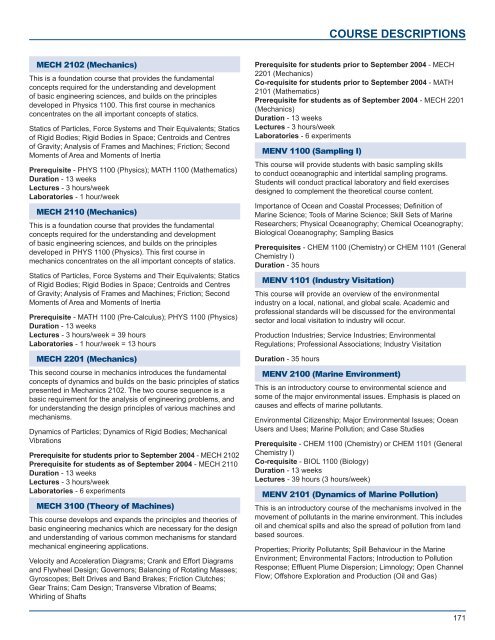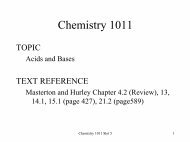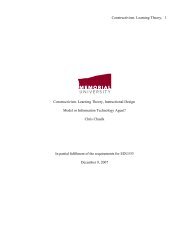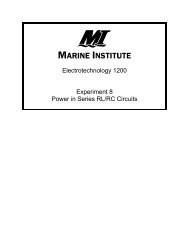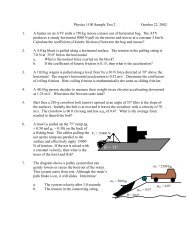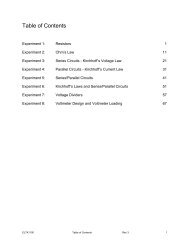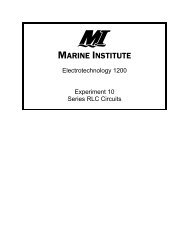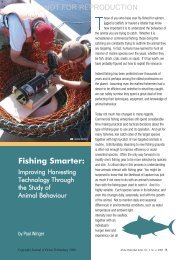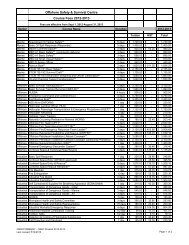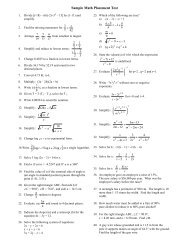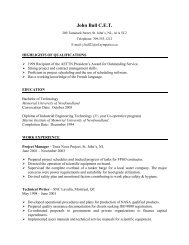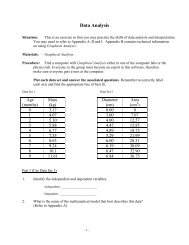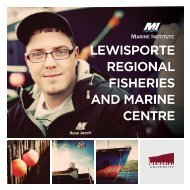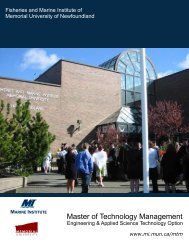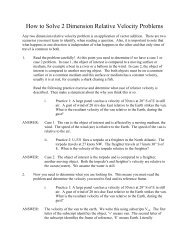Academic Calendar - Fisheries and Marine Institute - Memorial ...
Academic Calendar - Fisheries and Marine Institute - Memorial ...
Academic Calendar - Fisheries and Marine Institute - Memorial ...
You also want an ePaper? Increase the reach of your titles
YUMPU automatically turns print PDFs into web optimized ePapers that Google loves.
COURSE DESCRIPTIONS<br />
MECH 2102 (Mechanics)<br />
This is a foundation course that provides the fundamental<br />
concepts required for the underst<strong>and</strong>ing <strong>and</strong> development<br />
of basic engineering sciences, <strong>and</strong> builds on the principles<br />
developed in Physics 1100. This first course in mechanics<br />
concentrates on the all important concepts of statics.<br />
Statics of Particles, Force Systems <strong>and</strong> Their Equivalents; Statics<br />
of Rigid Bodies; Rigid Bodies in Space; Centroids <strong>and</strong> Centres<br />
of Gravity; Analysis of Frames <strong>and</strong> Machines; Friction; Second<br />
Moments of Area <strong>and</strong> Moments of Inertia<br />
Prerequisite - PHYS 1100 (Physics); MATH 1100 (Mathematics)<br />
Duration - 13 weeks<br />
Lectures - 3 hours/week<br />
Laboratories - 1 hour/week<br />
MECH 2110 (Mechanics)<br />
This is a foundation course that provides the fundamental<br />
concepts required for the underst<strong>and</strong>ing <strong>and</strong> development<br />
of basic engineering sciences, <strong>and</strong> builds on the principles<br />
developed in PHYS 1100 (Physics). This first course in<br />
mechanics concentrates on the all important concepts of statics.<br />
Statics of Particles, Force Systems <strong>and</strong> Their Equivalents; Statics<br />
of Rigid Bodies; Rigid Bodies in Space; Centroids <strong>and</strong> Centres<br />
of Gravity; Analysis of Frames <strong>and</strong> Machines; Friction; Second<br />
Moments of Area <strong>and</strong> Moments of Inertia<br />
Prerequisite - MATH 1100 (Pre-Calculus); PHYS 1100 (Physics)<br />
Duration - 13 weeks<br />
Lectures - 3 hours/week = 39 hours<br />
Laboratories - 1 hour/week = 13 hours<br />
MECH 2201 (Mechanics)<br />
This second course in mechanics introduces the fundamental<br />
concepts of dynamics <strong>and</strong> builds on the basic principles of statics<br />
presented in Mechanics 2102. The two course sequence is a<br />
basic requirement for the analysis of engineering problems, <strong>and</strong><br />
for underst<strong>and</strong>ing the design principles of various machines <strong>and</strong><br />
mechanisms.<br />
Dynamics of Particles; Dynamics of Rigid Bodies; Mechanical<br />
Vibrations<br />
Prerequisite for students prior to September 2004 - MECH 2102<br />
Prerequisite for students as of September 2004 - MECH 2110<br />
Duration - 13 weeks<br />
Lectures - 3 hours/week<br />
Laboratories - 6 experiments<br />
MECH 3100 (Theory of Machines)<br />
This course develops <strong>and</strong> exp<strong>and</strong>s the principles <strong>and</strong> theories of<br />
basic engineering mechanics which are necessary for the design<br />
<strong>and</strong> underst<strong>and</strong>ing of various common mechanisms for st<strong>and</strong>ard<br />
mechanical engineering applications.<br />
Velocity <strong>and</strong> Acceleration Diagrams; Crank <strong>and</strong> Effort Diagrams<br />
<strong>and</strong> Flywheel Design; Governors; Balancing of Rotating Masses;<br />
Gyroscopes; Belt Drives <strong>and</strong> B<strong>and</strong> Brakes; Friction Clutches;<br />
Gear Trains; Cam Design; Transverse Vibration of Beams;<br />
Whirling of Shafts<br />
Prerequisite for students prior to September 2004 - MECH<br />
2201 (Mechanics)<br />
Co-requisite for students prior to September 2004 - MATH<br />
2101 (Mathematics)<br />
Prerequisite for students as of September 2004 - MECH 2201<br />
(Mechanics)<br />
Duration - 13 weeks<br />
Lectures - 3 hours/week<br />
Laboratories - 6 experiments<br />
MENV 1100 (Sampling I)<br />
This course will provide students with basic sampling skills<br />
to conduct oceanographic <strong>and</strong> intertidal sampling programs.<br />
Students will conduct practical laboratory <strong>and</strong> field exercises<br />
designed to complement the theoretical course content.<br />
Importance of Ocean <strong>and</strong> Coastal Processes; Definition of<br />
<strong>Marine</strong> Science; Tools of <strong>Marine</strong> Science; Skill Sets of <strong>Marine</strong><br />
Researchers; Physical Oceanography; Chemical Oceanography;<br />
Biological Oceanography; Sampling Basics<br />
Prerequisites - CHEM 1100 (Chemistry) or CHEM 1101 (General<br />
Chemistry I)<br />
Duration - 35 hours<br />
MENV 1101 (Industry Visitation)<br />
This course will provide an overview of the environmental<br />
industry on a local, national, <strong>and</strong> global scale. <strong>Academic</strong> <strong>and</strong><br />
professional st<strong>and</strong>ards will be discussed for the environmental<br />
sector <strong>and</strong> local visitation to industry will occur.<br />
Production Industries; Service Industries; Environmental<br />
Regulations; Professional Associations; Industry Visitation<br />
Duration - 35 hours<br />
MENV 2100 (<strong>Marine</strong> Environment)<br />
This is an introductory course to environmental science <strong>and</strong><br />
some of the major environmental issues. Emphasis is placed on<br />
causes <strong>and</strong> effects of marine pollutants.<br />
Environmental Citizenship; Major Environmental Issues; Ocean<br />
Users <strong>and</strong> Uses; <strong>Marine</strong> Pollution; <strong>and</strong> Case Studies<br />
Prerequisite - CHEM 1100 (Chemistry) or CHEM 1101 (General<br />
Chemistry I)<br />
Co-requisite - BIOL 1100 (Biology)<br />
Duration - 13 weeks<br />
Lectures - 39 hours (3 hours/week)<br />
MENV 2101 (Dynamics of <strong>Marine</strong> Pollution)<br />
This is an introductory course of the mechanisms involved in the<br />
movement of pollutants in the marine environment. This includes<br />
oil <strong>and</strong> chemical spills <strong>and</strong> also the spread of pollution from l<strong>and</strong><br />
based sources.<br />
Properties; Priority Pollutants; Spill Behaviour in the <strong>Marine</strong><br />
Environment; Environmental Factors; Introduction to Pollution<br />
Response; Effluent Plume Dispersion; Limnology; Open Channel<br />
Flow; Offshore Exploration <strong>and</strong> Production (Oil <strong>and</strong> Gas)<br />
171


